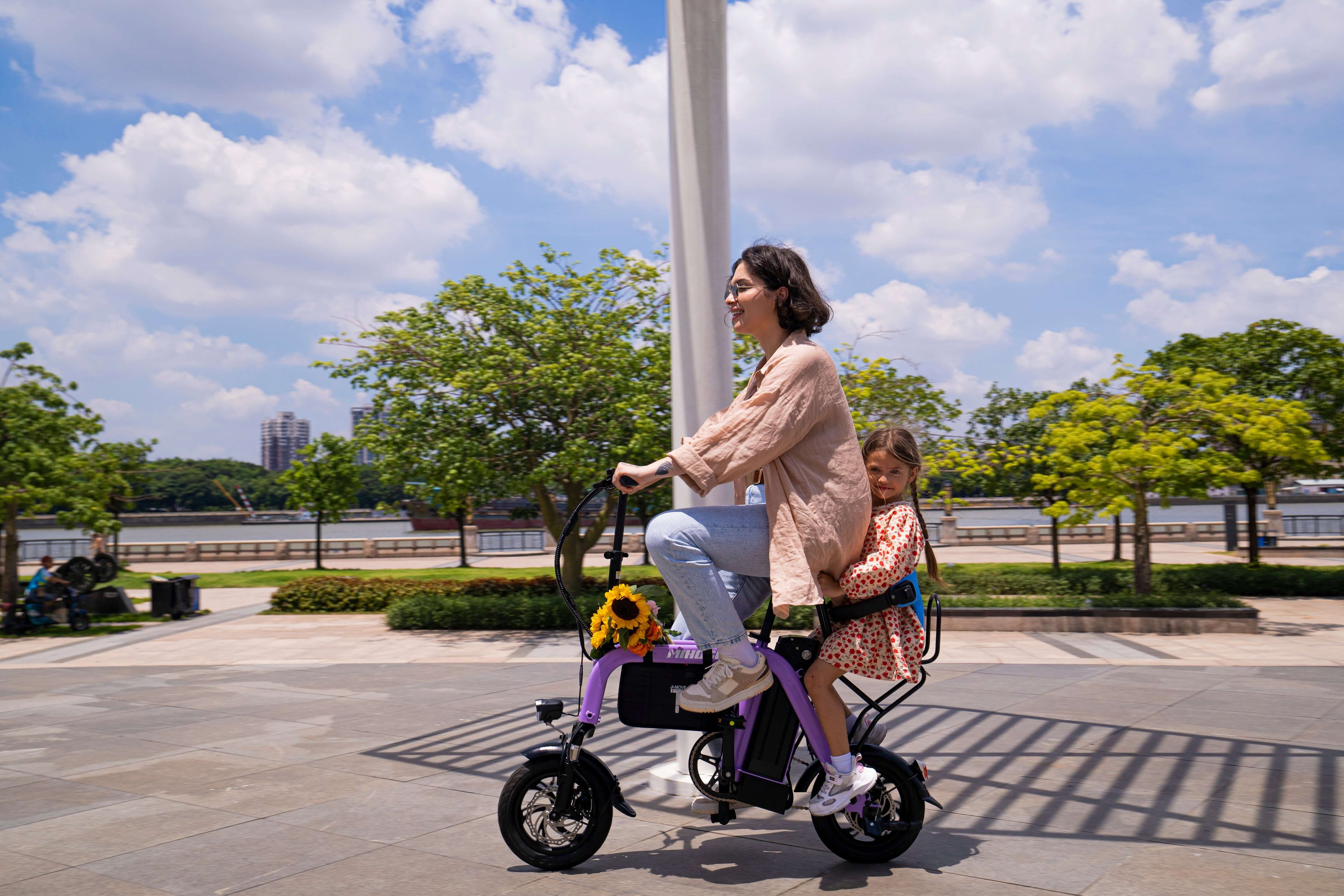Understanding E-Bike Carbon Offset Programs
Carbon offset programs represent verified initiatives designed to reduce, avoid, or remove greenhouse gas emissions from the atmosphere. When integrated with e-bike adoption, these programs create a dual impact: replacing high-emission transportation while supporting additional environmental projects.
Studies show that if just 15 percent of urban transportation miles were made by e-bike, carbon emissions could be reduced by 12 percent. This remarkable potential has prompted governments and organizations worldwide to implement comprehensive e-bike carbon offset initiatives.
The Science Behind E-Bike Environmental Impact
E-bikes use 90% less energy and produce 86%-95% fewer emissions than private cars. Unlike traditional vehicles that emit approximately 404g of CO2 per mile, electric bikes generate minimal emissions even when accounting for electricity generation and battery production.
According to peer-reviewed research, CO2 saving capability per person can exceed 750 kg CO2 per person annually for residents of rural areas and the rural-urban fringe, making e-bikes particularly effective for suburban and rural communities seeking to reduce their carbon footprint.
Mihogo's Revolutionary Carbon Offset Contribution
Mihogo Air750 Max: Premium Carbon Reduction
The Mihogo Air750 Max represents the pinnacle of sustainable transportation technology, combining lightweight carbon fiber construction with exceptional environmental performance.
Environmental Specifications:
- 750W Motor Power: Maximum efficiency with minimal energy consumption
- 121-Mile Range: Extensive coverage reducing car dependency
- Carbon Fiber Frame: Lightweight design requiring less manufacturing energy
- 25 MPH Speed: Efficient travel reducing trip duration and energy use
Each Mihogo Air750 Max potentially replaces hundreds of car trips annually, contributing significantly to carbon offset programs through direct emission avoidance.
Mihogo ONE Utility E-Bike: Maximum Environmental Impact
The Mihogo ONE Utility E-Bike delivers unprecedented carbon reduction potential with its industry-leading 167-mile range and versatile utility design.
Carbon Offset Features:
- 167-Mile Range: Longest distances covered per charge cycle
- 750W Motor: Optimized power delivery for maximum efficiency
- Utility Capacity: Replaces cargo vehicle trips
- All-Weather Performance: Year-round carbon reduction capability
This model exemplifies how sustainable transportation can achieve both personal mobility goals and environmental objectives.
Mihogo RX 2.4: Compact Carbon Solutions
The Mihogo RX 2.4 proves that effective carbon offset contributions don't require large vehicles. This folding e-bike maximizes environmental impact through intelligent design.
Offset Advantages:
- Folding Design: Multimodal transportation reducing overall emissions
- 500W Motor: Efficient power consumption
- 40-Mile Range: Substantial daily car trip replacement
- Portable Storage: Encourages consistent use over car alternatives
Mihogo Mini: Accessible Environmental Action
The Mihogo Mini democratizes participation in carbon offset programs by providing an affordable entry point to sustainable transportation.
Environmental Benefits:
- 350W Motor: Energy-efficient operation
- 62-Mile Range: Significant car trip replacement capability
- Lightweight Design: Reduced manufacturing carbon footprint
- Universal Accessibility: Enables broader participation in carbon reduction
Real-World Carbon Offset Program Implementation
Government-Led Initiatives
Cities like Shoreline have launched $670,000 programs to bring about 100 free e-bikes to residents as part of ongoing efforts to reduce air pollution caused by transportation. These initiatives demonstrate how e-bikes serve as practical tools for municipal carbon offset programs.
The Climate Commitment Act initiative specifically targets "overburdened communities" by making climate-friendly transportation more accessible, proving that carbon offset programs can address both environmental and social equity concerns.
Corporate Carbon Offset Integration
Leading organizations increasingly recognize e-bikes as essential components of their carbon neutrality strategies. Top carbon offset projects in 2025 focus on initiatives that deliver measurable environmental, social, and economic benefits, making e-bike programs attractive for corporate sustainability goals.
Transportation Decarbonization Programs
Modern carbon offset programs extend beyond simple emission reduction to encompass comprehensive transportation system transformation. E-bikes enable organizations to achieve multiple sustainability objectives simultaneously.
Measuring Environmental Impact
Quantified Carbon Reduction
Research indicates that e-bikes have the capability to cut car carbon dioxide emissions by up to 50% (about 30 million tonnes per year) in England alone. When scaled globally, this represents enormous potential for climate action.
Mihogo Impact Calculations:
- Daily Commute Replacement: 20-mile daily car commute replaced by Mihogo e-bike saves approximately 2.9 tons CO2 annually
- Weekend Activity Substitution: Monthly recreational car trips replaced save additional 0.8 tons CO2 yearly
- Cargo Transport Replacement: Utility e-bike replacing delivery vehicle trips saves 1.2 tons CO2 per year
- Multi-trip Efficiency: Single e-bike enabling car-free day per week saves 1.5 tons CO2 annually
Lifecycle Environmental Assessment
Unlike simple calculators, comprehensive carbon offset programs consider the entire e-bike lifecycle:
- Manufacturing Emissions: Mihogo's efficient production processes minimize initial carbon debt
- Operational Efficiency: Low-energy consumption during use maximizes offset benefits
- Battery Management: Advanced battery technology extends lifespan reducing replacement emissions
- End-of-Life Recycling: Sustainable disposal programs ensure minimal environmental impact
Advanced Carbon Offset Features
Smart Technology Integration
Modern e-bike carbon offset programs leverage technology for maximum environmental impact:
GPS Tracking: Real-time monitoring of car trips avoided and carbon saved App Integration: Digital platforms calculating personal carbon offset contributions Route Optimization: AI-powered systems maximizing emission reduction per trip Community Challenges: Gamification encouraging sustained environmental action
Battery Technology and Sustainability
Mihogo's advanced battery management systems optimize both performance and environmental impact. Longer battery life means fewer replacements, reduced manufacturing emissions, and enhanced carbon offset effectiveness.
Future of E-Bike Carbon Offset Programs
Policy Development Trends
In 2025, local carbon credits representing units corresponding to one ton of CO₂ avoided through projects conducted in specific geographic areas enable companies to offset emissions by financing actions close to their place of activity. This trend positions e-bike programs as ideal local carbon offset initiatives.
Technology Integration
Emerging technologies will enhance e-bike carbon offset program effectiveness:
- Blockchain Verification: Immutable records of carbon offset contributions
- IoT Sensors: Precise measurement of environmental impact
- AI Analytics: Predictive modeling for optimized carbon reduction
- Renewable Integration: Solar charging stations maximizing clean energy use
Carbon Credit Marketplace Integration
Future e-bike carbon offset programs will likely integrate with formal carbon credit markets, allowing individuals and organizations to monetize their emission reductions while contributing to global climate goals.
Economic Benefits of E-Bike Carbon Offset Programs
Cost-Effective Climate Action
E-bike carbon offset programs offer exceptional value compared to traditional offset purchases. While forest-based offsets may cost $15-50 per ton of CO2, e-bike programs provide immediate, verifiable, and local emission reductions at lower effective costs.
Long-term Financial Impact
Individual Benefits:
- Fuel cost savings: $2,000-4,000 annually
- Maintenance reduction: $500-1,200 yearly
- Health cost avoidance: $300-800 annually
- Carbon credit potential: $50-150 per year
Organizational Benefits:
- Employee carbon offset program cost: 30-50% lower than traditional offsets
- Corporate sustainability goal achievement: measurable and verifiable
- Public relations value: demonstrable environmental leadership
- Regulatory compliance: proactive emission reduction strategy
Implementation Strategy for Organizations
Program Design Elements
Phase 1: Assessment and Planning
- Carbon footprint analysis focusing on transportation emissions
- Employee commuting pattern evaluation
- Infrastructure requirement assessment
- Budget allocation for e-bike carbon offset initiatives
Phase 2: Mihogo Fleet Deployment
- Selection of appropriate Mihogo models for user needs
- Charging infrastructure installation
- Safety training and program orientation
- Initial impact measurement baseline establishment
Phase 3: Monitoring and Optimization
- Real-time carbon offset tracking and reporting
- User engagement enhancement strategies
- Program expansion based on success metrics
- Integration with broader sustainability initiatives
Success Metrics
Effective e-bike carbon offset programs measure multiple impact dimensions:
Environmental Metrics:
- Total CO2 emissions avoided through car trip replacement
- Energy consumption reduction compared to traditional transport
- Air quality improvement in program areas
- Broader environmental co-benefits achievement
Social Metrics:
- Program participation rates and user satisfaction
- Health improvement indicators among participants
- Community engagement and awareness levels
- Equity and accessibility achievement across demographics
Conclusion: Accelerating Climate Action Through E-Bike Innovation
E-bike carbon offset programs represent a paradigm shift in environmental action, combining immediate personal benefits with measurable climate impact. Mihogo's innovative electric bicycle technology enables individuals and organizations to participate meaningfully in carbon reduction while enjoying enhanced mobility and economic benefits.
As governments, corporations, and communities increasingly prioritize carbon neutrality, e-bike carbon offset programs offer scalable, verifiable, and cost-effective solutions. Whether through the premium performance of the Mihogo Air750 Max, the versatile capability of the ONE Utility, the convenient portability of the RX 2.4, or the accessible efficiency of the Mini, every Mihogo e-bike contributes to a sustainable transportation future.
The integration of e-bikes into comprehensive carbon offset strategies demonstrates how technological innovation can accelerate climate action while improving quality of life. As we advance toward 2025 and beyond, e-bike carbon offset programs will play increasingly vital roles in achieving global climate goals.
Transform your environmental impact today with Mihogo's revolutionary e-bike technology. Join the carbon offset revolution that's reshaping how we think about transportation, sustainability, and climate action.







